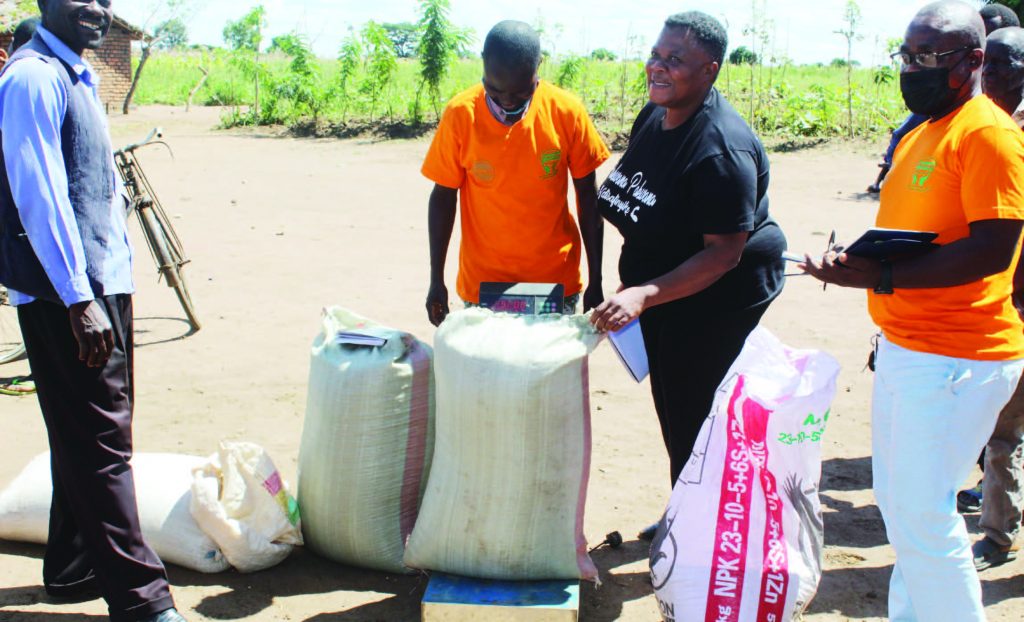Improving the quality of life with Soya bean farming
Chitseka is a small village located about 15 kilometres north of Kabudula Trading Centre along the Air wing—Kasiya–Santhe Road in Traditional Authority Khongoni in Lilongwe District.
Most of the people in the area rely on subsistence farming for survival and others depend on pieceworks to feed themselves and their families.

Jose Natiele is one of the individuals whose life has improved through smallholder farming. So far, he can send his children to school from the proceeds of his smallholding.
The 60-year-old, who has two wives and 10 children, has been a subsistence farmer since his teen years.
The piece of land he inherited from his parents was not enough to provide for his family. If shared among the family, none of his children or wives would harvest enough to feed themselves throughout the year.
As a result, Natiele had to find an alternative source of income to complement his earnings from the smallholding. That search led him to Chitseka Village Savings and Loans (VSL) group. The micro-loan institution gave him a loan to secure capital for his small hawker business.
Through the VSL, which has since rebranded to Chitseka Soya Club, he learned to save a portion of his earnings for future use whenever he got a surplus, mostly during seasons where he got bumper yields.
Says Natiele: “As a bread winner and also someone who is growing old, I realised it was high time I gave my children the best in life.
“We have had challenges in the past when it came to having enough food in the house. Money was a big problem and whenever we harvested our produce, I never planned how to make a fortune from [my crops]. But with expertise from the VSL, I am now able to save money.”
He is now the chairperson of the club which has 50 members comprising 30 females and 20 males.
Natiele says as a lone farmer acting outside of a support group, it was hard for him to find stable and reliable markets to sell his produce.
He says: “One challenge affecting us smallholder farmers is [the unavailability of] markets. We end up selling to vendors who steal from us. This is why I applaud the idea of contract farming because it provides farmers with markets to sell their produce.”
In 2020, the club was identified by Fincoop Savings and Credit Cooperative Limited (Fincoop Sacco) which encouraged them to grow soya beans and sell as a group.
They then shared the money according to the amount of soya beans each member contributed to the club.
Another member, Maria Jekeseni, says she is now able to help her husband with household bills and her newfound financial independence has strengthened her family.
She says excitedly: “Through the VSL, my husband knows my relevance in the family. We no longer fight over financial issues or the lack of money in the family. My family is a happy home.”
Jekeseni, however, encourages her fellow farmers to take farming as a business and use the knowledge gained from the VSLs.
She adds: “It is no secret that the health of our family members has also improved. We now know how to take care of our surroundings and the kind of food we have to eat to remain healthy. And it is all through the lessons we get from the VSLs.”
Zakeyo Milimo, a father of four, says his farming business has grown with the money he got from the last farming season and is planning to acquire more land in the 2021-2022 growing season.
“I could not have achieved that if it were not for the support I got from Fincoop and having a readily available market made us work harder and we hope to do the same in the forthcoming growing season, that is, if they will continue supporting us, “ he says.
Fincoop field officer Aaron Kaponda says he decided to start meeting Katseka Soya Club after observing how dedicated some of the farmers were.
He says: “We had to join about six VSLs in the area and it is in this aggregation of individual potential members where a decision was made to work as a cluster to produce soya on contract farming with Afri-Seed.
“The major objective was financial aggregation through savings. The savings are then lent to individual members to improve the status of their individual businesses through knowledge-sharing and training facilitation programmes from Fincoop.”
Currently, the farmers have fully been linked to Fincoop training activities through funding from the Financial Access for Rural Markets, Smallholders and Enterprise Programme (Farmse).
They have also been trained in Sacco’s methodology and financial literacy, and as a result are now able to save money and grow their businesses.
Fincoop Sacco manager Macmillan Nankhonya says: “This was a loan that helped the farmers to access certified seeds for soya and support for production.
“On this one, we focused on market linkages where we connected the farmers to an off-taker [Afri-seed] who secured seed for them. We paid on behalf of the farmers in the form of a loan and later bought the produce from them.”
He adds that the proceeds of the sales were channelled to them through their Fincoop accounts.
Adds Nankhonya: “We want to create a generation with a saving culture. For us to develop, we need to cultivate that spirit in us and Fincoop is one institution with that goal.”
According to the 2016 report by the African Institute for Corporate Citizenship (Aicc), smallholder farmers account for 91 percent of total soya bean production in Malawi. The report showed that most farmers have limited access to agricultural technologies.
National production of soya beans in Malawi averages about 170 000 metric tonnes per year.





